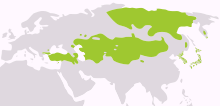Portal:Languages and literatures of Eastern Asia

Altaic languages
[edit]
Altaic is a proposed language family that is held by its proponents to include the Turkic, Mongolic, Tungusic, and possibly the Japonic language families and the Korean language isolate. These languages are spoken in a wide arc stretching from northeast Asia through Central Asia to Anatolia and eastern Europe (Turks, Kalmyks). The group is named after the Altai Mountains, a mountain range in Central Asia.
Turkish
[edit]Uyghur
[edit]Manchu
[edit]Ainu
[edit]- An Ainu–English–Japanese Dictionary (1905), by John Batchelor (transcription project)
- Aino Folk-Tales (1888), by Basil Hall Chamberlain
Japanese
[edit]- See also Japanese Wikisource
Japanese is a language spoken by over 130 million people in Japan and in Japanese emigrant communities. It is a member of the Japonic (or Japanese-Ryukyuan) language family, which has a number of proposed relationships with other languages, none of which has gained wide acceptance among historical linguists.
Language
[edit]- An Elementary Grammar of the Japanese Language (1888), by Tatui Baba
- "Japan, III. Language and Literature," by Francis Brinkley in Encyclopædia Britannica (11th ed., 1911).
- A Japanese-English and English-Japanese Dictionary (transcription project)
- "English-Chinese-Japanese Lexicon of Bibliographical, Cataloguing and Library Terms" (1944), by Harold Allison Mattice.
- "The nature of the Japanese language, and its possible improvements", by Joseph Edkins, in Transactions of the Asiatic Society of Japan 1: 96–110.
- "Has Japanese an affinity with Aryan languages", by William George Aston, in Transactions of the Asiatic Society of Japan 2: 223–231.
- Rōmaji or Rōmazi (1940), by Edwin Oldfather Reischauer
Literature
[edit]Korean
[edit]- See also Korean Wikisource
Korean is the official language of Korea, both South and North. It is also one of the two official languages in the Yanbian Korean Autonomous Prefecture in People's Republic of China. There are about 78 million Korean speakers worldwide. In the 15th century, a national writing system was commissioned by Sejong the Great, the system being currently called Hangul.
- ALA-LC Romanization Tables: Korean Romanization and Word Division, 2009 by The Library of Congress
- Baekbeomilji, 1947 by Kim Gu, translated by Wikisource
Chinese
[edit]- See also Chinese Wikisource and Min Nan Wikisource
Chinese, or the Sinitic language(s), is a language family consisting of languages which are mostly mutually unintelligible to varying degrees. There are between 7 and 13 main regional groups of Chinese (depending on classification scheme), of which the most spoken, by far, is Mandarin (about 850 million), followed by Wu (90 million), Cantonese (Yue) (70 million) and Min (50 million). Most of these groups are mutually unintelligible, although some, like Xiang and the Southwest Mandarin dialects, may share common terms and some degree of intelligibility.
Language
[edit]
- Chinese Without a Teacher, 1922 by Herbert Allen Giles
- Essays on the Chinese Language, 1889 by Thomas Watters
- A progressive course of colloquial Chinese, 1903 by Thomas Francis Wade
- Chinese Dialogues, Questions, and Familiar Sentences, Literally Rendered (1863), by Walter Henry Medhurst (1796-1857), revised by Walter Henry Medhurst (1822-1885) (transcription project)
- Synoptical Studies in Chinese Character, 1874 by Herbert Allen Giles
- The Chinese Speaker. Readings in Modern Mandarin, 1916 by Evan Morgan
- "Eugraphia Sinensis" by in Transactions of the Royal Asiatic Society, 1 (1823), pp. 304–312
Cantonese (Yue)
[edit]Southern Min (Minnan)
[edit]Fujian (Quan-Zhang, Hokkien)
[edit]- Excellent Ancient Adages, Together with Notes on the Writings of Chinese Romanized in the Hokkien Dialect, 1890 by Cheah Toon Hoon
Chaozhou (Teochew)
[edit]- A Chinese and English vocabulary, in the Tie-chiu dialect (transcription project), 1883 by Josiah Goddard
- First Lessons in the Tie-chiw Dialect (transcription project), 1841 by William Dean
Shantou (Swatow)
[edit]- Handbook of the Swatow Dialect, 1877 by Herbert Allen Giles
- Elementary Lessons In The Swatow Dialect, 1881 by John Campbell Gibson
- English-Chinese Vocabulary of the Vernacular Or Spoken Language of Swatow (transcription project), 1883 by Rudolf Lechler, Samuel Wells Williams, William Duffus
- Handbook of the Swatow Vernacular (transcription project), 1886 by Lim Hiong Seng
- Dictionary of the Swatow dialect, 1883 by Adele Marion Fielde
- Primary Lessons in Swatow Grammar, 1884 by William Ashmore
Eastern Min (Mindong)
[edit]Fuzhou (Foochow, Hokchew)
[edit]- The Chinese Language Spoken at Fuh Chau, 1856 by Moses Clark White
- Dictionary of the Foochow Dialect, 1929 by R. S. Maclay, C. C. Baldwin and Samuel H. Leger
- An English-Chinese Dictionary of the Foochow Dialect (transcription project), 1905 by T. B. Adam
- A Manual of the Foochow Dialect In Twenty Lessons (transcription project), by C. M. S. and A. E. Champness
Hakka
[edit]Literature
[edit]- See Portal:Chinese literature
- See also Portal:Chinese classics
Vietnamese
[edit]Burmese
[edit]The Burmese language is the official language of Burma. Burmese is the native language of the Bamar and related sub-ethnic groups of the Bamar, as well as that of some ethnic minorities in Burma like the Mon.
- Grammatical Notices of the Burmese Language, 1842 by Adoniram Judson
- Grammar of the Burmese Language, 1883 by Adoniram Judson
Thai
[edit]- See Portal:Thai language
- See also Thai Wikisource
Dravidian languages
[edit]The Dravidian languages are a language family spoken mainly in southern India and parts of eastern and central India as well as in northeastern Sri Lanka, Pakistan, Nepal, Bangladesh, and overseas in other countries such as Malaysia and Singapore. The most populous Dravidian languages are Telugu, Tamil, Kannada, and Malayalam.
